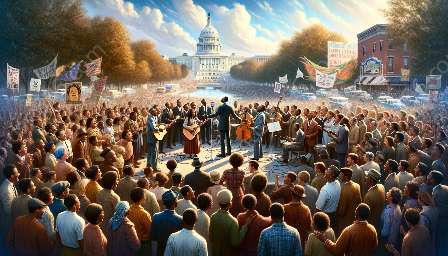Gospel music has undoubtedly played a significant role in shaping the religious, cultural, and musical identity of Christian communities throughout history. The genre has a deep-rooted history, evolving from spirituals and hymns to become a powerful medium for conveying faith, hope, and the celebration of spiritual experiences. This article aims to explore the profound influence of Gospel music on Christian communities and its compatibility with the history of Gospel music and overall music history.
History of Gospel Music
The roots of Gospel Music can be traced back to the early 17th century when enslaved African people brought with them their musical traditions, including spiritual songs and hymns, to the United States. These spirituals were deeply rooted in the African-American experience, serving as a means of expressing spiritual devotion and resilience in the face of enslavement and oppression.
The genre continued to evolve throughout the 18th and 19th centuries, with the incorporation of elements from various musical traditions, including European hymnody and the blues. As Gospel music gained popularity, it became an integral part of the African-American church services, acting as a form of worship and a source of inspiration for the congregation.
The early 20th century marked a significant period for the expansion of Gospel music, with the emergence of influential figures such as Thomas Dorsey, often referred to as the 'Father of Gospel Music.' Dorsey played a pivotal role in blending elements of blues and jazz with Christian lyrics, leading to the birth of modern Gospel music as we know it today.
Over the decades, Gospel music continued to diversify, encompassing various subgenres such as traditional Gospel, contemporary Gospel, and Gospel rap, each resonating with different Christian communities and contributing to the rich tapestry of Gospel music expression. Today, Gospel music remains a vibrant and integral part of the Christian musical tradition, both within the church and in mainstream music.
Influence of Gospel Music on Christian Communities
The influence of Gospel music on Christian communities is multifaceted, extending beyond its musical and cultural impact to encompass profound spiritual and social significance.
1. Spiritual Upliftment: Gospel music serves as a source of spiritual upliftment and inspiration for Christian communities, providing a musical platform for expressing faith, hope, and devotion. The powerful messages conveyed through Gospel lyrics resonate with believers, fostering a deep sense of connection with their spiritual beliefs and values.
2. Community Cohesion: Gospel music plays a vital role in fostering community cohesion within Christian congregations. The communal singing and musical participation during church services create a sense of unity and solidarity, strengthening the bond among believers and reinforcing their shared religious identity.
3. Cultural Expression: Gospel music embodies the cultural expression and heritage of Christian communities, reflecting the unique experiences, traditions, and challenges faced by different groups of believers. The music becomes a vehicle for preserving and celebrating cultural diversity within the Christian faith.
4. Social Activism: Throughout history, Gospel music has been intertwined with social activism and the pursuit of justice. Gospel songs have served as anthems for civil rights movements, conveying messages of equality, dignity, and freedom, while inspiring individuals to advocate for positive change within their communities.
5. Global Impact: The influence of Gospel music extends far beyond local communities, reaching a global audience and transcending cultural boundaries. The universal themes of faith, love, and redemption conveyed through Gospel music resonate with individuals from diverse backgrounds, fostering a sense of spiritual connectedness and empathy.
Compatibility with the History of Music
When considering the influence of Gospel music on Christian communities, its compatibility with the history of music becomes evident through several key aspects:
1. Evolution of Musical Styles: Gospel music has significantly contributed to the evolution of musical styles by integrating elements of blues, jazz, and soul with traditional hymnody and spirituals. This fusion of musical genres has influenced the development of various music styles, including R&B, soul, and contemporary Christian music, shaping the broader landscape of musical history.
2. Inspiration for Artists: Many musicians and artists across different genres have drawn inspiration from Gospel music, incorporating its emotive melodies, powerful vocals, and spiritual themes into their own musical creations. This cross-pollination of musical influences has enriched the fabric of music history, leading to the emergence of diverse musical movements and genres.
3. Influence on Popular Culture: Gospel music has permeated popular culture, influencing mainstream music and entertainment. Its impact can be observed in the rise of Gospel-influenced genres, as well as the incorporation of Gospel elements in numerous chart-topping songs and performances, demonstrating its enduring relevance in contemporary music history.
4. Spiritual and Emotional Resonance: Gospel music's ability to evoke profound spiritual and emotional responses in listeners has made it a timeless and influential force within the broader spectrum of musical history. Its transcendent themes of faith, love, and perseverance continue to resonate with audiences across generations, leaving an indelible mark on the human experience.
Conclusion
In conclusion, Gospel music has wielded a profound influence on Christian communities, shaping their spiritual, cultural, and musical landscape. Its rich history, evolution, and impact on religious and cultural traditions have intertwined with the broader history of music, leaving a lasting imprint on the human experience.
As Gospel music continues to evolve and diversify, its influence on Christian communities remains steadfast, carrying forward the legacy of resilience, faith, and social justice. Through its powerful melodies and uplifting messages, Gospel music stands as a testament to the enduring power of music in shaping religious identities, igniting the spirit, and fostering unity across diverse communities.




































